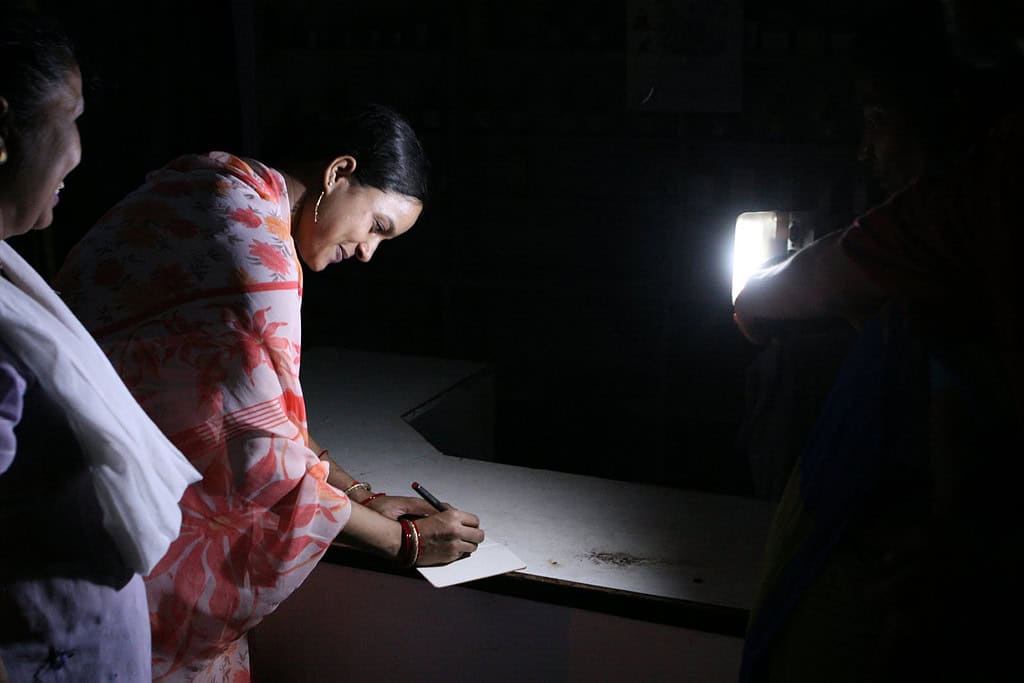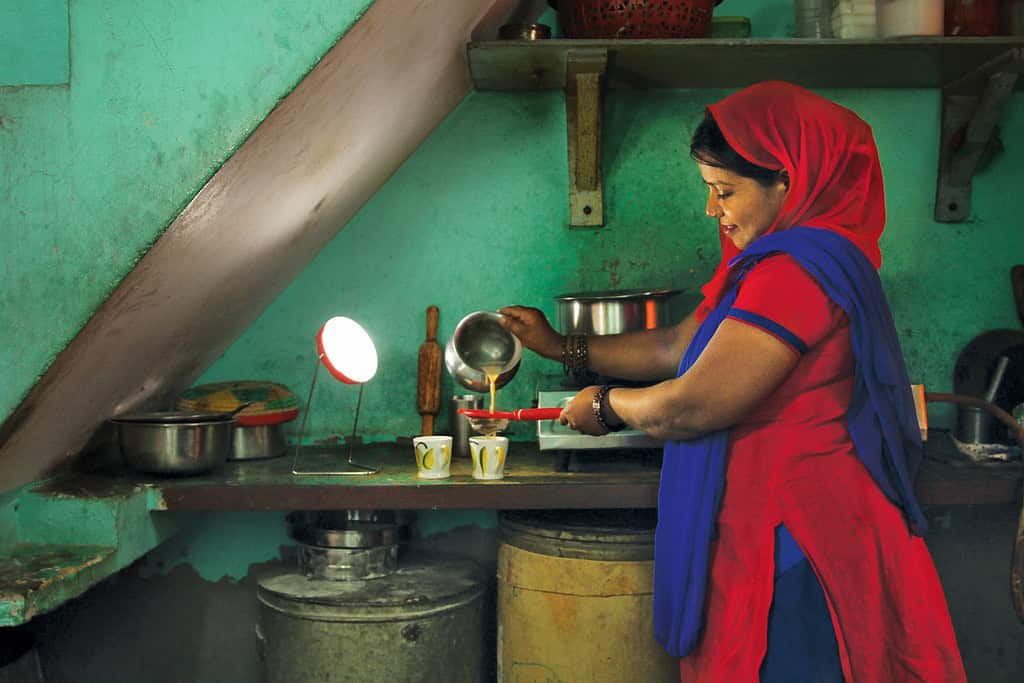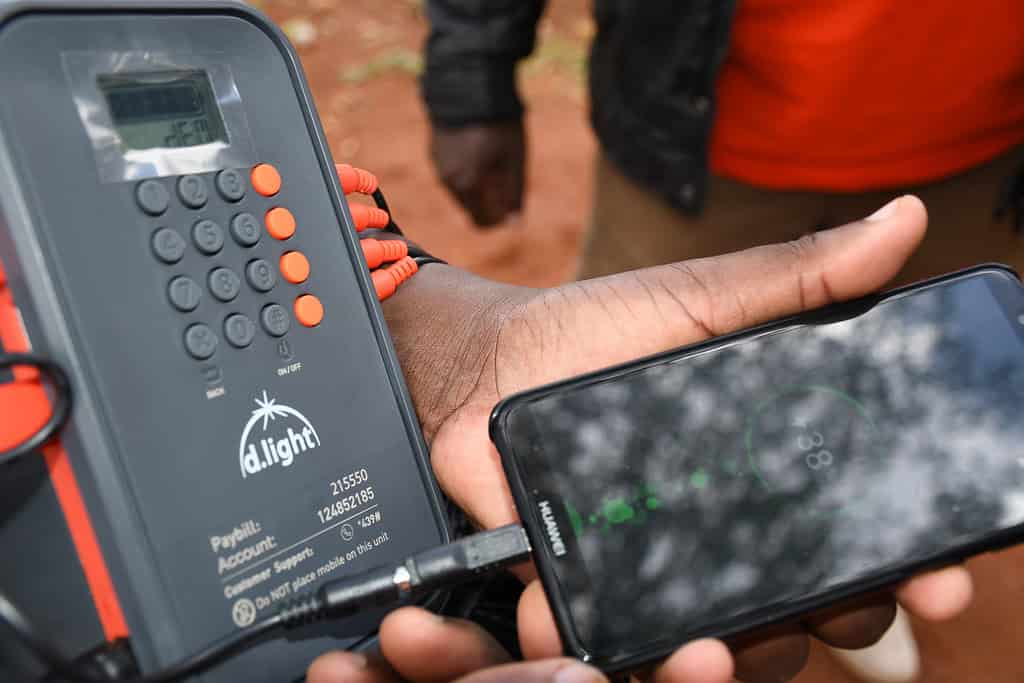d.light
Acumen fuels d.light's rise as a top solar firm, bridging the global energy gap
- Case Study
- Renewable energy
- East Africa

For over a decade, Acumen has supported d.light’s journey to scale to become one of the largest off-grid solar companies in the world. d.light addresses the “energy access gap” through providing an array of affordable, solar-powered products and financing options to low-income families across the globe.
The problem
In 2007, 1.6 billion people lacked access to energy, with the majority in Sub-Saharan Africa and developing Asia. Most of those people relied on low-quality kerosene lanterns and candles as their primary light source. Yet kerosene is dangerous, harmful, and expensive. It causes household fires, its fumes damage health and the environment, and fuel consumes 15% of household income as of 2013.
Energy poverty perpetuates general poverty. Children have limited study time, families are unable to perform household duties after dark, business operations stall, and safety becomes an issue. As a result, community development is severely restricted.
The Origin
From growing up in developing countries to working in the Peace Corps, co-founder Sam Goldman observed firsthand that neither the private nor the public sector adequately addressed the global need for reliable electricity. At Stanford Business School, he met Ned Tozun, a serial entrepreneur who shared his vision to empower those at the bottom of the economic pyramid.
Together, they transformed a class project—a simple, battery-powered LED light—into d.light, a social enterprise with a founding mission to provide affordable and sustainable lighting solutions to 100 million people by 2020. Their first product, a solar-powered lamp, made its debut in the marketplace in 2008—designed for off-grid households in South Asia, Africa, and beyond.
The Solution
Recognizing the lack of adequate lighting solutions in these off-grid communities, d.light co-founders Sam Goldman and Ned Tozun set out to create a high-quality, affordable lantern for low-income families. Through an initial product launch in India and many iterations, they developed a solar-powered LED lantern that worked reliably in rural, off-grid environments. At the time, solar products had a reputation for being poorly made, so families and businesses didn’t use or trust them. So d.light established a six-month warranty (later extended to two years) to help encourage customers to purchase the product.They also sold through trusted, local distributors and had quality customer support in the rural communities they intended to serve.
Over time, d.light expanded their product range across four categories: solar lanterns, solar home systems, appliances, and solar inverters. Their larger solar home systems are now designed to power multiple household devices, offering a comprehensive solution to energy needs in remote areas, with a focus on Africa and Asia.
To reach even more low-income households, d.light found a way to enable customers to pay for products over time. With existing financing options falling short, d.light created their own pay-as-you-go (PAYGO) platform. PAYGO allows users in remote areas to access solar power through affordable daily digital payments.
“I used to spend a lot of money on kerosene and there was always so much smoke. There is a real change with the d.light. It is more convenient, so easy and not too costly. I never, never would have believed something like this would come.”
d.light customer
The Impact
- 175M lives empowered
- 38M tons of CO2 avoided
- $5B saved in energy expenditures
- 27B productive hours created
- 72M school-aged children reached.
Over the past decade, d.light has paved the way for the $20 billion global off-grid solar sector. d.light’s array of solar energy products are not only durable, long-lasting, safe, and non-polluting, but also cost 70% less than kerosene. As a result, 61% of user households feel safer, and 82% have moved up the “energy ladder”; or are no longer relying on kerosene, candles, firewood, and torches for their lighting needs. Moreover, their pay-as-you-go technology makes solar radically affordable.
“Life has improved greatly. Initially, we would spend money on buying paraffin, but we no longer have to. We now use the money to buy books and keep my children at school.”
d.light customer
The Investment
Acumen first invested in d.light in 2007, with a pre-seed investment for its initial product launch in India. Over the next 12 years, their partnership grew as d.light expanded its product line. Acumen invested in the next six funding rounds, several of which it led, leveraged tens of millions in capital, placed 10 Acumen Fellows and three board members in d.light, and provided millions in technical assistance. KawiSafi, Acumen’s off-grid solar energy venture fund, joined d.light’s $30 million Series D round to help scale its PAYGO model.
The Story
Recognizing the potential in the prototype and the founders’ dedication to serving bottom-of-the-pyramid customers, Acumen took a leap of faith with a pre-seed Patient Capital investment to fuel d.light’s product launch. As commercial investors considered it too high risk and grants could only provide temporary support, Patient Capital filled that “Pioneer Gap”. This philanthropic-backed capital enabled the founders to prioritize impact from the beginning of their journey.
With this initial investment, the pair refined the lantern prototype, tested the product in India, built community trust by partnering with reputable local distributors, established a network of rural agents selling on commission, and implemented an unprecedented six-month warranty.

Their efforts paid off, as d.light exceeded Acumen’s expectations on revenue, impact, and sales in its initial product launch. Thus, Acumen proceeded to invest in the next six funding rounds, leading several of these rounds to provide credibility. Acumen also fostered key relationships, from placing one of Acumen’s founding advisors to serve as chair of d.light’s board to helping develop relationships with leading commercial investors.
With no major distribution partners in rural communities at the scale needed, these investments helped d.light build its own distribution network: incorporating a direct-to-consumer model to reach more customers in the hardest-to-reach areas. This kind of infrastructure-building is just one of the hidden costs that pioneer companies incur when creating new markets, and is the reason they require more patient, risk-aligned capital.
Yet despite years of growth, d.light hit a significant snag in 2015. With poor financial performance and management challenges, they needed capital to continue operating and pay back loans. Believing in d.light’s future, Acumen stood by the company, participating in their bridge funding round and giving the company runway to maneuver. With this investment, d.light was able to add three new portable products, improve its current products, and pilot its pay-as-you-go (“PAYGO”) platform.

d.light sought to scale their PAYGO system to reach more customers in one of their largest markets, East Africa. However, there were no growth stage equity funds serving the off-grid solar sector at the time, as investors perceived the sector too risky and unprofitable.
Recognizing the transformative potential of the off-grid energy sector, Acumen created KawiSafi in 2016, a growth fund dedicated to affordable, reliable energy solutions in low-income communities. KawiSafi’s investment in d.light’s Series D round was pivotal in expanding the PAYGO system. This collaboration also leveraged Acumen’s “Lean Data” initiative to gain critical insights into the affordability, profitability, and customer satisfaction of solar products. In 2022 alone, this PAYGO model unlocked 1.6 million people’s access to d.light’s solar product.
From the initial Patient Capital investment in product development to the KawiSafi investment to helping scale the off-grid solar market, Acumen’s financial, technical, and advisory support helped d.light serve 175 million people across the globe as of 2023—and become the largest off-grid solar company in the world.